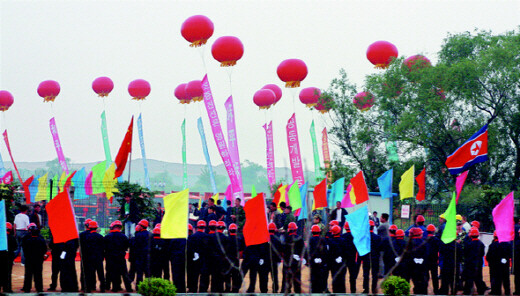hankyoreh
Links to other country sites 다른 나라 사이트 링크
[Editorial] N.Korea, China and Seoul

North Korea and China held a groundbreaking ceremony yesterday for joint development of Hwanggumpyong, an island located below Wihwa Island in the Yalu (Amnok) River. The event was attended by a host of senior officials from both countries, including Jang Song-thaek, National Defense Commission vice chairman and North Korean political heavyweight, and Chinese Commerce Minister Chen Deming. This indicates that economic cooperation between North Korea and China, which has primarily been carried out by Chinese local governments and regional businesses, is evolving into a new dimension spearheaded by the central government. It is being reported that Chang and Chen will also be attending events in the near future for development projects in China’s Changchun-Jilin-Tumen region and North Korea’s Rason Special District.
The ceremony yesterday was originally scheduled for the end of May, and its delay sparked much speculation. A number of analysts said the delay was the result of differences of opinion or friction between North Korea and China, and observers even downplayed the meaning of Kim Jong-il’s China visit in accordance with this perspective. Of course, we will not know until later whether their economic cooperation effort will be successful. At the current stage, it is crucial that we determine all the facts about this endeavor.
On June 6, North Korea convened an expanded meeting of its Workers’ Party of Korea (WPK) Political Bureau for a report and assessment of the outcome of Kim’s visit, and the standing committee of the Supreme People’s Assembly presented an ordinance designating Hwanggumpyong and Wihwa Island as special districts. This was the first expanded meeting in the thirty years since 1981, and if its staging bears a direct connection with Kim’s recent visits to China and the stepping up of economic cooperation with China, it is reasonable to link it with the possibility of a momentous change in strategy from North Korea.
The attempts to blame the roughly ten-day delay in the groundbreaking ceremony on friction or discord between North Korea and China and to downplay the importance of the cooperation or anticipate its failure are only the products of short-sightedness and preconceptions. This is dangerous not only because it prevents people from seeing the facts as they are, but also because it could carry the intent of justifying the misguided North Korean policy to date that has resulted in failure. In terms of its outcome, this perspective, far from bringing about changes, submission, or collapse from North Korea, has instead deepened its dependence on China and inter-Korean antagonism. The problem will only get worse if people fail to acknowledge this and insist on the current view.
In remarks yesterday criticizing the controversy over North Korea’s revelations of secret contact efforts by Seoul as “a deliberate attempt to put the South Korean government in a difficult position and foment conflict in South Korean society,” Minister of Unification Hyun In-taek urged Pyongyang to return to “a forum for inter-Korean dialogue.” Before calling for inter-Korean dialogue that has no chance of taking place, we recommend that he gain an objective understanding of the currents surrounding the Korean Peninsula, which have lately been undergoing rapid change.
Please direct questions or comments to [englishhani@hani.co.kr]
Editorial・opinion
![[Column] Has Korea, too, crossed the Rubicon on China? [Column] Has Korea, too, crossed the Rubicon on China?](https://flexible.img.hani.co.kr/flexible/normal/500/300/imgdb/original/2024/0419/9317135153409185.jpg) [Column] Has Korea, too, crossed the Rubicon on China?
[Column] Has Korea, too, crossed the Rubicon on China?![[Correspondent’s column] In Japan’s alliance with US, echoes of its past alliances with UK [Correspondent’s column] In Japan’s alliance with US, echoes of its past alliances with UK](https://flexible.img.hani.co.kr/flexible/normal/500/300/imgdb/original/2024/0419/2317135166563519.jpg) [Correspondent’s column] In Japan’s alliance with US, echoes of its past alliances with UK
[Correspondent’s column] In Japan’s alliance with US, echoes of its past alliances with UK- [Editorial] Does Yoon think the Korean public is wrong?
- [Editorial] As it bolsters its alliance with US, Japan must be accountable for past
- [Guest essay] Amending the Constitution is Yoon’s key to leaving office in public’s good graces
- [Editorial] 10 years on, lessons of Sewol tragedy must never be forgotten
- [Column] A death blow to Korea’s prosecutor politics
- [Correspondent’s column] The US and the end of Japanese pacifism
- [Guest essay] How Korea turned its trainee doctors into monsters
- [Guest essay] As someone who helped forge Seoul-Moscow ties, their status today troubles me
Most viewed articles
- 1[Column] The clock is ticking for Korea’s first lady
- 2After 2 months of delayed, denied medical care, Koreans worry worst may be yet to come
- 3Samsung barricades office as unionized workers strike for better conditions
- 4[Column] Has Korea, too, crossed the Rubicon on China?
- 5All eyes on Xiaomi after it pulls off EV that Apple couldn’t
- 6[Correspondent’s column] In Japan’s alliance with US, echoes of its past alliances with UK
- 7US overtakes China as Korea’s top export market, prompting trade sanction jitters
- 8Hong Se-hwa, voice for tolerance whose memoir of exile touched a chord, dies at 76
- 9[Photo] Smile ambassador, you’re on camera
- 10[Editorial] When the choice is kids or career, Korea will never overcome birth rate woes